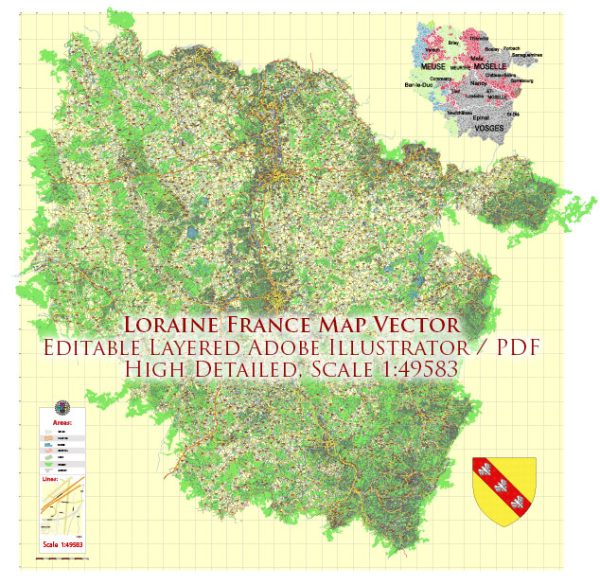Lorraine is a region in northeastern France with a diverse and productive agricultural sector. Here is a brief description of agriculture in Lorraine:
- Crops: Lorraine’s agricultural landscape consists of fertile plains and hilly terrain. The region is known for growing a variety of crops, including wheat, barley, corn, sugar beets, and potatoes. These crops are essential for both local consumption and export.
- Vineyards: Lorraine has a small but growing wine industry, particularly in the Moselle department. The region produces wines like Côtes de Toul and Moselle. These wines are primarily white and are made from grape varieties like Auxerrois, Pinot Gris, and Pinot Blanc.
- Livestock Farming: Livestock farming is an important component of Lorraine’s agriculture. The region is known for its dairy farming, producing milk, cheese, and other dairy products. Additionally, cattle, poultry, and pig farming are also prevalent.
- Forestry: Lorraine has extensive forested areas, making forestry an important industry. Timber production and related wood products play a crucial role in the regional economy.
- Agribusiness: The region is home to several food processing companies and agribusinesses that contribute significantly to the economy. These companies process agricultural products, such as meat, dairy, and cereals, into various food products for domestic and international markets.
- Organic Farming: There is a growing interest in organic farming in Lorraine, with more farmers adopting sustainable and environmentally friendly practices. Organic produce and products from the region are becoming increasingly popular.
- Agricultural Fairs and Festivals: Lorraine hosts various agricultural fairs and festivals throughout the year, showcasing its agricultural products and promoting the rich agricultural heritage of the region.
- Challenges: Like many agricultural regions, Lorraine faces challenges such as adapting to changing climate conditions, modernizing farming practices, and addressing environmental sustainability concerns.
In summary, Lorraine’s agriculture is diverse and productive, with a focus on both crop cultivation and livestock farming. The region’s agricultural products, especially its wines and dairy products, are known for their quality and contribute to the local economy.


 Author: Kirill Shrayber, Ph.D. FRGS
Author: Kirill Shrayber, Ph.D. FRGS